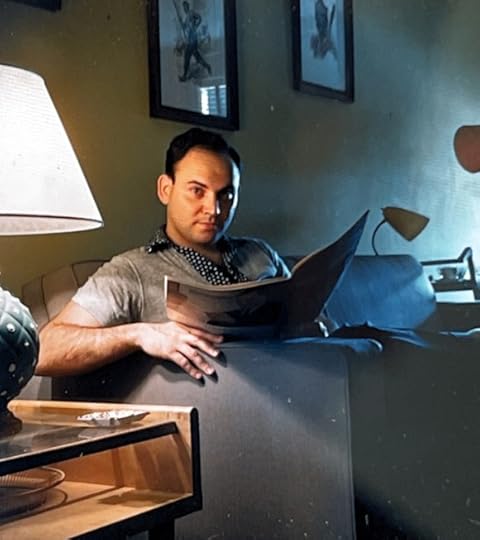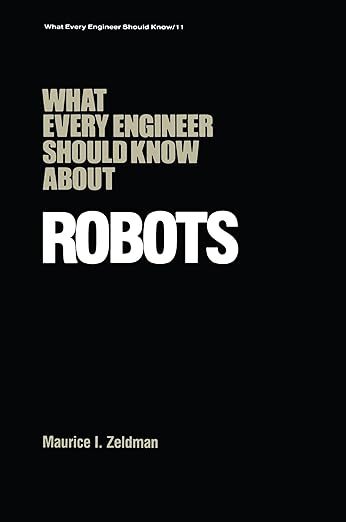My Glamorous Life: Bots, Books, and Betrayal
My father was an engineer who designed robots. When I first learned what he did, I imagined the Robot from “Lost in Space,” and asked him to make me one. When I turned 13, I realized that the pick-and-place robots he designed replaced assembly-line workers, and asked how he, who’d been a socialist in his impoverished youth, could create something that took anyone’s job away.
“Those are depressing, repetitive jobs,” he said. “Those folks can be trained to do more interesting work: work that stimulates their mind. Pays lots better, too.”
Actually, that’s what he meant to say, but how he expressed it was:
“A steam shovel takes away the job of 1000 Coolies digging with teaspoons. Should we not have steam shovels?”
Oof. My father and his words.
Uh-oh. Let me explain…My father didn’t mean to be racist with that “Coolie” crack. He was as anti-racist as any white man of his generation, which in his case was actually a lot.
Like he wouldn’t watch “Gone With the Wind” because, in his words, “it’s anti-Negro.”
He would say this angrily, with wet eyes.
As a young man, my father had been a civil rights worker who worked to enroll voters in Harlem. His heart was in the right place.
(But also: He had major emotional problems, constant bubbling rage from untreated childhood trauma, and undiagnosed spectrum stuff, which made him brilliantly inventive and creative, but also left him almost incapable of speaking for ten minutes without offending someone, often profoundly. Where was I? Oh, yes.)
 Maurice Zeldman as a young man.
Maurice Zeldman as a young man.As for the “Negro” in “anti-Negro,” my father was taking his lead from the Black community itself. This was the era of the United Negro College Fund and the NAACP, when a white person calling a Black person a “Negro” was showing respect, strange as it sounds to modern ears.
And he was profoundly right about that damned film, which whitewashed slavery and depicted Black people as either sweet, overgrown children or violent rapists crazed by white flesh. (Still later in my life, when cable TV became a thing, it appalled me that Ted Turner played “Gone With the Wind” seemingly every other week on his big channels, TNT and TBS.) I’m not saying it’s a badly made or unambitious film. Just that it’s racist af. So fuck Ted Turner. Fuck him for platforming “Gone With the Wind” every ten minutes. Fuck him two times for creating the 24-hour cable news cycle. Look where that’s gotten us.
But I digress.

(NOTE: I can’t watch any film with Clark Gable since I learned that he wore dentures that stank—something his glamorous leading ladies had to endure during dialog and kissing scenes. It’s not that I judge the poor man for his health problems and the state of dentistry in the 1930s. It’s just that, ick, it shatters the romantic illusion movies work so hard to create. But I digress again. I can’t watch “Gone With the Wind” because it is racist, and I’m glad my father gave me that understanding when I was young.)
Beep Boop
Wait a minute, how did I get into all this? I was talking about my dad creating robots for Perkin-Elmer, American Machine & Foundry, and Rockwell International. Robots that didn’t look anything like the talking, beeping 1950s sci-fi robots in the old movies I grew up adoring.
I was talking about how my once-socialist, pro-worker dad helped create products (like pick-and-place robots) that replaced human workers on the assembly line.
Not that that reminds me of anything happening today. Although I should probably ask my chatbot to check and make sure.
(That’s humor, kid—is what my dad would have said.)
Betrayed!By the way, if you’re so inclined, you can buy a Kindle copy of my dad’s book, “What Every Engineer Should Know about Robots,” from you-know-who. Technically, my father and I wrote the book together: he supplied the knowledge, I brought the writing chops.
When he brought me in on his book-writing assignment, my father promised to share a coauthoring credit with me. But in the end, he couldn’t do it, and I was listed in an acknowledgement as a “creative editor,” whatever that means.
I found out when I saw the printed book that I’d been denied my credit.
My dad could have told me in advance. He could have lied and said the publisher insisted on only crediting one author. How would I have known any different? I was only 23.
But he said nothing.
Not that I’m bitter. My dad was profoundly abused in his childhood. While he came across as having a huge ego, inside he was more fragile than silence. To have given me the boost my writing career desperately needed at the time was simply too difficult for him. It needed to be his book, so everyone would know Murray Zeldman was a genius.
At least, that’s what my mother told me when she saw me sitting quietly in a corner, looking like I’d been gut punched.
I have long understood and forgiven my dad, although at the time I could only feel hurt. (Also at the time I was working blue- and grey-collar jobs that barely covered my rent and bus fare; even if it didn’t immediately boost my financial circumstances, it would have been swell for my self-esteem to have the publishing credit I’d earned. But I digress.)
Besides, it was a great learning experience: mindful of the pain I felt when screwed out of my credit, I’ve made it a point during my decades of work to always credit my colleagues for their contributions. I hope I have not failed to do that.
But we were talking about chatbots or something. Right?
Say, look here, I’ll tell you what Claude.ai and ChatGPT can’t do: write a memoir as disorganized, digressive, and curdled in the stench of resentment as this here—but what is this thing I’ve written here, anyway? A lament? A word salad dressed in thousand island tears? Who can say? I was dreaming when I wrote this. For you. Always for you, my dear daughter.
The post My Glamorous Life: Bots, Books, and Betrayal appeared first on Jeffrey Zeldman Presents.



